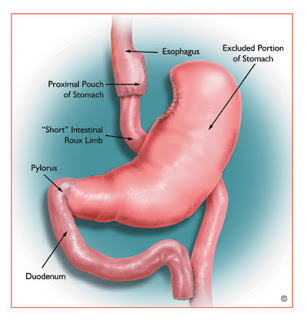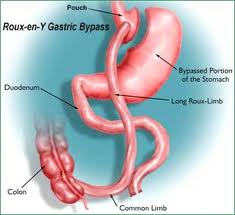- Two years after gastric bypass surgery, the mean weight loss was 45 kg.
- At 6 years postop, the mean weight loss was 36.3kg (so there was about 20% weight regain, which is very consistent across studies).
- At 12 years postop, the mean weight loss was 35kg – so weight was overall stable from 6 years to 12 years after surgery.
- At 2 years postop, 75% of diabetes had gone into remission.
- At 6 years postop, 62% of diabetes cases were in remission
- At 12 years postop, 51% of diabetes cases were in remission.
- The likelihood of diabetes being in diabetes remission at 12 years was 8.9 times higher for those who had had surgery compared to those who wanted but did not get surgery, and 14.8 times higher than those who did not want surgery in the first place.
- At 12 years, the likelihood of being in diabetes remission was highest in people who had diet controlled diabetes before surgery (remission rate 73%), less for people who needed pills to treat their diabetes before surgery (remission rate 56%), and
lowest for people who required insulin to treat their diabetes before surgery (remission rate 16%). - At 12 years, there was a 91-92% lower risk of having new type 2 diabetes develop in patients who had had bariatric surgery, compared to the non surgery groups.
- On average, weight loss is stable over the long term after gastric bypass surgery – though the results can be different for different people, and certainly lifelong dedication to permanent lifestyle changes are essential for continued success.
- Gastric bypass surgery can be a powerful tool to not only put diabetes into remission, but also to decrease the risk of developing diabetes later on. Earlier intervention is better, because the longer a person has diabetes, the more tired their pancreas gets (ie decreased beta cell function, which are the cells that produce insulin), and a tired pancreas may be too tired to control blood sugars after bariatric surgery without help from medication. Thus, considering bariatric surgery early in the course of diabetes, or even in the prediabetes phase, may have the most powerful impact.
www.drsue.ca © 2017












